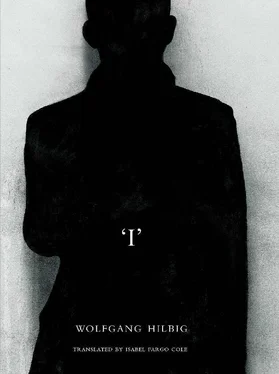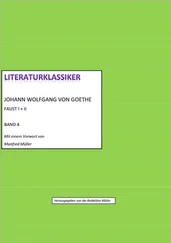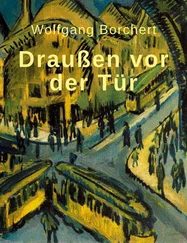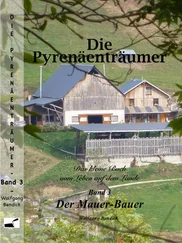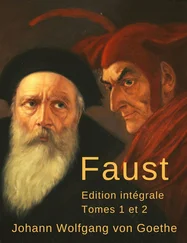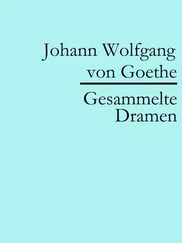Beneath the roof of Friedrichstrasse Station West, night-grey, extremely makeshift-seeming and soiled with all the filth of civilization, that would hardly be possible. Here I was still the one I’d been for so long now: the sober observer with no sense of time — time as nothing but a playfully deployable signifier on the left wrist — the person of perceptions, his mind trained to fit his observations into methodical-looking linguistic formulae. . among the people on the platform, herded like cattle from one corral to the next, and in the far-too-weak glow of the station lighting, I was merely a nondescript member of a self-contained organization which could with equal justification be called a ruling tribe or a secret service, I was one of the last bleary-eyed refugees from the filthy movie theatres, someone for whom making the last night bus was the ultimate wish fulfilment. . and dressed in washed-out grey to green, the universal colours of the underground, and probably at the point of turning transparent or invisible, as had Harry, whose name I could just as well have borne. — No, the border crossing hadn’t made me M. W. again, not by a long shot, clearly that would take a long time, real time I’d have to spend in a completely different place. .
But the border crossing could be a start, I thought. And then one day I could go to some West Berlin editorial office, or a literary agency, and introduce myself: I being identical with the poet M. W., known for a total of seventeen poems in magazines and anthologies, over half of them in so-called unofficial magazines; ranked, by the media that focused on such things, among those new young writers currently regarded as representing their country’s unofficial literature. .
At some point I’d slipped up and capitalized ‘unofficial’ in this context. . a while later I’d suddenly found this form to be right and proper; I’d gone so far as to abbreviate ‘Unofficial Literature’ as UnLit in my reports.
Of course Unofficial Literature sounded rather like ‘fictional literature’, which referred not to fiction (Feuerbach used the English word), but to something that pretended to be literature. — I might introduce myself and meet with utter perplexity; logically enough, people in the literary profession (German Studies people, critics, etc.) dealt only with official literature; one couldn’t rule out the possibility that they’d have no knowledge of UnLit whatsoever. Recently there had been an extensive anthology of this poetry, for whose slightly sentimental title I couldn’t vouch: Affection Is Just a Fringe Phenomenon ?11 but I’d never got my hands on a copy, and I didn’t know if any of my work — M. W.’s — was in there. . probably not, since Feuerbach had access to Western publications and would have told me immediately. And I didn’t know if there’d be any point invoking a tiny publication like Circus of Mice . .
Had Feuerbach known the ideas I was toying with, he never would have let me out of his sight for four weeks. Four weeks long I lived for the day, with no compulsion (no inner or outer compulsion) to write reports; in the so-called Scene I switched from venue to venue just like an autochthonous Scene member; I’d lost sight of my target person and regarded her merely as a person (and Feuerbach could also have said he’d lost sight of his target person for four weeks. . referring to me; but he explained his absence with the meagre words: a training course!); and in the Scene I’d mostly mingled with the people who were thinking about publishing opportunities. It was less and less about publishing in the West; the discussion revolved increasingly around a growing number of home-made publications now brought out at almost regular intervals, long since appearing periodically in Leipzig, Dresden and Karl-Marx-Stadt, and I was especially interested in these magazines; lately I’d been thinking more and more often that I ought to take a closer look at these magazines.
In these four weeks I’d found out a number of addresses I felt you had to know about if you were looking for places to publish literary work. . and hardly any of them were in the West any more, they were the addresses of contacts for those magazines in Leipzig and in Dresden: for those unauthorized so-called literary magazines self-produced in various formats and techniques . . that was the jargon in which we at the Firm would have described these target objects. — I had noted just a very few of the addresses. . writing them down on tiny slips of paper, not producing a list of them, though it would have been an impressive list, one with which I could have furnished new benchmarks for intelligence work in this field (it had quickly grown clear to me that the Firm vastly underestimated the full extent of these activities). . but no, first I wanted to use these addresses myself. And I had hidden the slips of paper with the addresses, not in my flat, but in my hideout at Frau Falbe’s.
I didn’t want to think about what Feuerbach would have said. — So you are too! I imagined his words. You’re using your findings for egotistical purposes too. It sounds like you could use a little training course yourself. — I didn’t care, all that might have interested me was that little word too . — At night in my room at Frau Falbe’s I had busied myself — often at the point of despair — with the remains of my literary production: I wanted to sort them with a view to placing them in the ‘so-called literary magazines’ of the Leipzig and Dresden Scenes. My aim was to single out from my piecemeal oeuvre as many texts as possible that could stand on their own, or at least pass as fragments readable on their own (as texts without closure , in a sense!). . in my view this put me pretty close to the latest textual theories; could it be true that the neostructuralists had recognized the fragment as the only truly contemporary text? — I might even have to break some of the longer pieces into several separate parts, chopping up what had been so arduously assembled. .
And then I’d have to place the pieces in magazines, in lots of magazines at once, in all the magazines, I planned to set off a little flood of my work in the unofficial magazines. And on that basis I could peddle them all over again in the West!
That was what you might call a constructive plan! It required the knowledge of several addresses (stuck in the crack between the cushions of Frau Falbe’s armchair) and a bit of information on publishing and editorial practices in the West. . and in all probability some sort of contact person familiar with these practices. — But first, of course, I had to have enough texts to draw on (I’d spoken of a flood!). . and this, for now, seemed to be the sticking point of the endeavour.
I was now faced with a crucial question: Should I involve Feuerbach in my deliberations or not? — If I didn’t, if, in other words, I acted entirely as an author— autonomous, ruthless. . self-confident? — I had to rely on fragmentary knowledge, on information from the Scene, where everyone was groping in the dark themselves, and even on rumours. I might end up with the wrong addresses, go heading down blind alleys or on detours. The literature industry in the West was incredibly dependent on the ups and downs of fashion; when the spring collections were created there, in the autumn, something which still seemed completely off-base might be a bestseller half a year later. . so you had to find people, if possible in the autumn, to explain to readers what kind of literature was a must-have in spring. . and so each spring and autumn there was a constantly growing list of literary works or genres you simply had to have read. . the consequence being that readers — though perhaps well disposed at first — regarded literature in general as superfluous; after all, they’d had their own experiences with the market economy. .
Читать дальше
